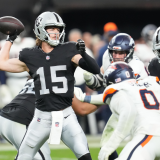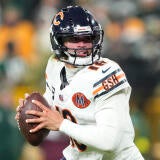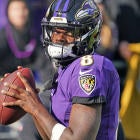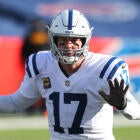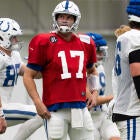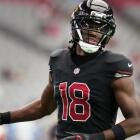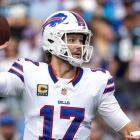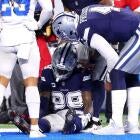Five reasons why Lamar Jackson doesn't have his big contract and five counterarguments for each
Each of the talking points regarding why Jackson doesn't have the fully guaranteed contract he desires has a strong counterargument

Baltimore Ravens quarterback Lamar Jackson's desire for a fully guaranteed contract is the NFL's most polarizing free agency storyline in years. Jackson, a 26-year-old playing the NFL's most valuable and highest-paid position who was once the unanimous NFL MVP (2019), has every right to ask for a fully guaranteed contract and as his own agent, he seemingly has. Minnesota Vikings quarterback Kirk Cousins signed a fully guaranteed contract of three years and $84 million when he hit free agency in 2018, and Cleveland Browns quarterback Deshaun Watson signed a five-year, $230 million contract that was also fully guaranteed upon his arrival via trade last offseason.
The chasm between the Ravens' contract offers and Jackson's counteroffers is so wide that the Pro Bowler tweeted that he has requested to be traded. The idea of Jackson signing such a deal has potential suitors around the league tying themselves into a knot talking about his value. Here's what Atlanta Falcons owner Arthur Blank said about his pursuit of Watson a year ago versus their lack of interest in Jackson now.
"Different player, different time," Blank said Tuesday, via The Athletic. "You have a winner [in Jackson], a MVP in the league. There's no question he's one of the top quarterbacks in the league. Looking at it objectively, I'd say there's some concern over how long can he play his style of game. Hopefully a long time ... but he's missed five, six games each of the last two years. Each game counts a lot in our business."
Here's a breakdown of the reasons why Jackson is still without the contract of his dreams and why any of those arguments could be proven to be faulty. FYI, any team in the NFL could extend a contract offer sheet to him since the Ravens put a non-exclusive franchise tag on their team's signature player. If the Ravens opted not to match, the offering team would have to surrender two first-round picks, the market rate for an in-their-prime, top-level quarterback.
1. The NFL's worry about guaranteed contracts
North America's most popular and wealthiest professional sports league doesn't hand out fully guaranteed contracts with regularity. This practice allows for teams to cut players whenever they want with minimal salary cap penalties. The Cousins and Watson examples above occurred only because their respective teams were desperate for competent quarterback play. In the case of Watson, the Browns were once out of the running to trade for him as it appeared the Georgia native had his eyes on the south between the Carolina Panthers, Atlanta Falcons, and New Orleans Saints. Watson ended up in Ohio thanks to Cleveland's Hail Mary contract extension offer of a fully guaranteed, five-year, $230 million contract.
At the NFL owners meetings a year ago, Baltimore Ravens owner Steve Bisciotti blasted his AFC North rival Browns for their aggressive Watson deal, foreshadowing the tense negotiations going on today.
"It's like, 'damn, I wish they hadn't guaranteed the whole contract,'" Bisciotti said in 2022, via The Athletic. "I don't know that he should've been the first guy to get a fully guaranteed contract. To me, that's something that is groundbreaking, and it'll make negotiations harder with others. But it doesn't necessarily mean that we have to play that game, you know? We shall see."
The MLB, NBA, and NHL -- the other three North American professional sports leagues -- provide all of their players with fully guaranteed contracts. That's the norm. However, Indianapolis Colts owner Jim Irsay, the head of a team that has a glaring quarterback need right now, articulated a passionate opinion against handing out guaranteed contracts when it comes to football.
"As an owner I do not believe in fully guaranteed contracts," Irsay said Tuesday, per The Athletic. "I think that a percentage is one thing, but from what I've seen from the NBA and baseball, I don't see it as a positive competitively. For me, for the good of the game, boy, I don't believe guaranteed contracts would be good for our game at all. At all. I don't think (they) make our game greater, I think it makes it worse."
Counterargument: Jackson isn't advocating for guaranteed contracts for all, just for the best, young quarterbacks in the league like himself.
Jackson is a singular talent. He is one of only six players in NFL history to have over 100 passing touchdowns (101) and over 4,000 rushing yards (4,437). He's the fastest player to hit these bench marks by a whopping 31 games. His career rushing yards total of 4,437 is already the fifth-most by a quarterback in NFL history, and his total is also 1,230 MORE rushing yards through five seasons than any other quarterback all time.
100+ pass TD & 4,000+ rushing yards
NFL history
| QB | Games Needed To Hit Benchmarks |
|---|---|
Lamar Jackson | 67 |
Randall Cunningham | 98 |
103 | |
Michael Vick | 103 |
| Russell Wilson | 129 |
| Steve Young | 161 |
The Ravens go from a playoff contender to a sub-.500 football team with and without Jackson throughout his career. In 2022, they averaged 25 points per game with him in Weeks 1-12 while putting up 12.5 points per game without him from Weeks 13-18, the second-fewest in the NFL in that span ahead of only the New York Jets (11 points per game).
Ravens by starting QB since drafting Lamar Jackson in 2018
| Lamar Jackson | All Others | |
|---|---|---|
W-L | 45-16* | 8-13 |
Win Pct | .738 | .381 |
Points Per Game | 28.0 | 20.0 |
* Tied with Hall of Famer Roger Staubach for the sixth-most wins (45) through 61 career regular-season starts by any starting QB since at least 1950
The bottom line is Jackson is special. Guaranteed contracts would only be for special quarterbacks like himself, not the entire league. Pay him what he's worth, which is more than Watson.
2. Health concerns
"Looking at it objectively, I'd say there's some concern over how long can he play his style of game," Blank said Tuesday. "Hopefully a long time ... but he's missed five, six games each of the last two years. Each game counts a lot in our business."
Jackson has missed 10 of his last 22 possible games played since the start of the 2021 season including the playoffs because of injury (bone bruise in ankle in 2021 and sprained PCL tendon in knee in 2022) after missing none due to injury during his first three seasons from 2018-2020.
Counterargument: Jackson isn't close to being as injury-riddled as other quarterbacks to receive top-dollar contracts.
Watson was signed to his five-year, $230 million fully guaranteed deal despite having two torn ACLs over the course of his football career: once in 2014 when he was at Clemson and another time in 2017 when he was a rookie with the Houston Texans. Dallas Cowboys quarterback Dak Prescott signed a four-year, $160 million contract extension in the 2021 offseason after missing the final 11 games of the 2020 season with a gruesomely broken ankle. Jackson's injury record is more pristine than either of theirs, thus taking some of the steam of that argument.
3. Scheme fit/reliance on the run
"Looking at it objectively, I'd say there's some concern over how long can he play his style of game," Blank said Tuesday.
Blank and other NFL owners see Jackson's record pace for accumulating rushing yards as a negative as he has 1,230 MORE rushing yards through five seasons than any other quarterback ever.
Most rush yards by QB
NFL history
| QB | Rush Yards |
|---|---|
Michael Vick | 6,109 |
Cam Newton | 5,628 |
Russell Wilson | 4,966 |
Randall Cunningham | 4,928 |
Lamar Jackson | 4,437* |
Steve Young | 4.239 |
Fran Tarkenton | 3,674 |
* 1,230 more rush yards through five seasons than any other QB all time
Jackson's Ravens have been a historically run-oriented attack despite the NFL trending more and more toward a passing-first league. They averaged 170.8 rushing yards per game from 2018-2022, the most in any five-year span by any team since the Pittsburgh Steelers from 1975-1979 when they averaged 172.5 rushing yards per game.
The dual-threat dynamo's presence in Baltimore's offense has led to the Ravens averaging 184.8 rushing yards per game when Jackson has been the team's starter, the most by any starting quarterback's team since the 1970 AFL-NFL merger among quarterbacks with a minimum of 30 starts.
Most team rush YPG by starting QB
since 1970 AFL-NFL merger, min. 30 starts
| QB | Team Rush YPG |
|---|---|
Lamar Jackson | 184.8 |
Roger Staubach | 166.9 |
Bob Avellini | 166.0 |
Bob Griese | 159.6 |
Counterargument: Both of Jackson's injuries have come in the pocket as a passer, and Jackson's Ravens have needed to operate as a run-first unit because of their lack of offensive spending, especially on wide receivers
Three-time First Team All-Pro and current New Orleans Saints safety Tyrann Mathieu refuted Blank's explanation as to why the Falcons aren't interested in 26-year-old, former unanimous NFL MVP Jackson on Wednesday.
This man got hurt twice inside the pocket. I’ve never seen anyone tackle him with a heavy hit in space, his game is special and rare. I have never seen this guy take a hit when running and not get up immediately(he owns a mean stiff arm. When he hurt himself it was inside pocket. https://t.co/3BtGJEpVPF
— Tyrann Mathieu (@Mathieu_Era) March 29, 2023
To Mathieu's point, Jackson's running style is a stark contrast to the bruising, battering ram style of quarterback rushing associated with current Buffalo Bills quarterback Josh Allen, current NFC champion Philadelphia Eagles quarterback Jalen Hurts, and 2015 NFL MVP quarterback Cam Newton. Jackson floats through space like a ghost, appearing as one part of the field in a split-second before magically maneuvering to the other side of the field like it was nothing. Many of Jackson's runs either end by him running out of bounds, running into the end zone or by him sliding down. There aren't many clips of Jackson being lit up like some of those other dual-threat quarterbacks. For reference, here's an eight-minute video displaying Jackson's penchant for running by tacklers, not through them.
As for the scheme-fit questions of Jackson because of the Ravens' run-heavy offense, those can be answered succinctly: Baltimore's offense is centered around the run because of their refusal to invest significant money into their offense. The Ravens have spent a combined $262.7 million on the offensive side of the ball since 2019, when Jackson became their full-time starting quarterback. That's the fewest amount of money spent on offense in the ENTIRE NFL in that span. Their wide receiver group has accounted for $47.2 million of that total since 2019, the second-fewest amount of money spent on wide receivers in that span ahead of only the Pittsburgh Steelers' league-low $34.2 million.
Naturally, Baltimore wide receivers have ranked dead last in receiving yards per game in three of the last four seasons since 2019. Tight end Mark Andrews, Jackson's top target, has 3,761 receiving yards since 2019, the second-most among tight ends behind only Kansas City Chiefs tight end Travis Kelce's 5,108 receiving yards in that span. The only other Raven with over 1,000 receiving yards from 2019-2022 is wide receiver Marquise Brown (2,361), the team's first-round pick in 2019. He was traded to the Arizona Cardinals last offseason in exchange for a first-round pick that eventually turned into center Tyler Linderbaum.
Ravens receiving YPG by WR
Last 4 seasons
| Season | Receiving YPG | NFL Rank |
|---|---|---|
2022 | 89.2 | Last |
2021 | 142.4 | 19th |
2020 | 108.1 | Last |
2019 | 88.7 | Last |
If another team, any of the other 31 who have spent more on their receivers than the Ravens since 2019, opted to trade for and pay Jackson, there's a strong chance Jackson could morph into a more pass-heavy player. During his MVP season in 2019, one in which he led the NFL in passing touchdowns with 36, his receiving yards leaders were Andrews, Brown, tight end Hayden Hurst, wide receiver Willie Snead, tight end Nick Boyle, and wide receiver Seth Roberts. Not exactly an all-star lineup.
4. Building around expensive quarterbacks is harder
Only two quarterbacks have led their teams to Super Bowl titles with one of the top two highest cap hits at their position in the last 28 years: Steve Young's 49ers in 1994 and Patrick Mahomes' Kansas City Chiefs in 2022. Yes, it is naturally harder for team to have a deeper roster when their quarterback has a higher cap hit.
The San Francisco 49ers have one of the deepest rosters in the NFL with both 2021 third overall pick Trey Lance and 2022 last overall pick (262nd) Brock Purdy on rookie contracts.
The 49ers have been able to spend near the top of the market on other top positions in re-signing wide receiver Deebo Samuel (three years, $71.6 million), re-signing tight end George Kittle (five years, $75 million), re-signing left tackle Trent Williams (six years, $138.1 million), re-signing linebacker Fred Warner (five years, $99.2 million), trading for running back Christian McCaffrey and his contract (four years, $64 million) as well as signing Pro Bowl defensive tackle Javon Hargrave away from the Eagles on a four-year, $80 million deal this offseason. Their formula for team-building has resulted in three conference championship game appearances and a Super Bowl Bowl LIV appearance in the 2019 seasons in the last four years.
Counterargument: The goal is to find an expensive quarterback because that means you have a face of the franchise to depend upon for years to come.
"And I hope one of these three guys [Trey Lance, Brock Purdy or Sam Darnold] gets a massive, massive extension with the San Francisco 49ers at some point," 49ers CEO Jed York said Tuesday. "But until then, we're going to make sure we build this thing around a young quarterback with a very team-friendly contract."
The team with arguably the deepest roster in the NFL strongly desires to lavish one of their quarterbacks with generational wealth because usually that means they have their long-term answer at the sport's most valuable position. A player whose first five seasons have unfolded like Lamar Jackson's is the goal when picking a quarterback in the NFL Draft. The smart teams lock down their top passers.
Mahomes did not hit free agency with his Chiefs signing him to a 10-year, $450 million contract. Buffalo Bills quarterback Josh Allen, a member of Jackson's 2018 draft class, did not hit free agency as his team signed him to a six-year, $258 million contract extension the moment he was eligible for an extension in the 2021 offseason. The Green Bay Packers contended for over a decade with Aaron Rodgers as their quarterback, constantly giving him market-resetting contracts to prevent him from hitting free agency. It's the goal in team-building. Jackson deserves to reset the quarterback market based on his age, production, and upside like his peers have.
5. Plenty of teams aren't looking for a quarterback
One problem for Jackson as he sits on his non-exclusive franchise tag is that most of the league appears to be content with their solution at their quarterback position for now. The Carolina Panthers, a would-be suitor based on need, just traded a huge package of picks plus wide receiver DJ Moore to the Chicago Bears for the first overall draft pick. The Houston Texans will just select the second-best quarterback prospect in the draft at second overall. The New Orleans Saints just lavished Derek Carr with a four-year, $150 million contract in free agency. The 49ers have committed to their younger quarterback room.
Jackson has yet to receive a contract offer sheet from another team, partly because of his contract demands and partly because of market scarcity as teams are currently satisfied with their quarterback situation
Counterargument: A number of teams could still sign and then trade for Jackson since they could structure his contract in a way to fit their 2023 salary cap situations. Jackson is one the top five or 10 quarterbacks in the NFL. He would be an upgrade over many teams' current projected starters at quarterback
The Atlanta Falcons, who are currently rolling with 2022 third-round pick quarterback Desmond Ridder as their starter with Taylor Heinicke as their backup, have $21.7 million in cap space. They could easily make a move for Jackson. The Indianapolis Colts, who may not have their quarterback prospect of choice available to them with the fourth overall pick in the 2023 NFL Draft, have $20.1 million in cap space. The Patriots have $10.7 million in cap space and could trade for Jackson with a couple other roster adjustments.
Quarterbacks like Lamar Jackson don't become potentially available very often, if ever. At 26 years old, he would be the youngest player EVER to change teams after previously winning an NFL MVP award, and his MVP came unanimously. He's a generational talent. Based on his production and potential upside at his age, Jackson deserves a market-resetting contract.




